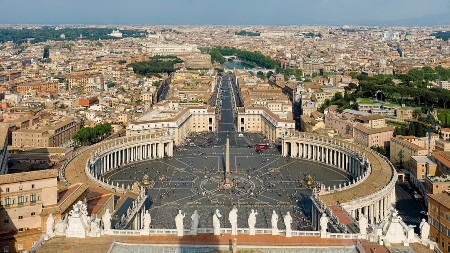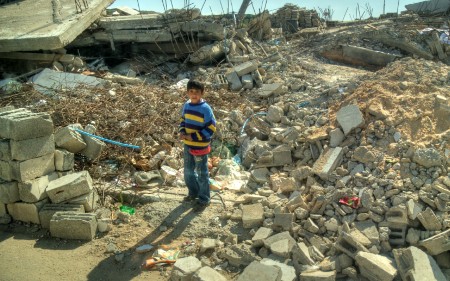Formation for the Priesthood (Part 1)
FREE Catholic Classes
Regardless of the form it has taken, secularization has provoked a collapse of Christian culture in our countries.
Highlights
Chiesa (chiesa.espresso.repubblica.it)
6/12/2009 (1 decade ago)
Published in Europe
ROME (Chiesa) - Here is the first part of the speech of the secretary of the congregation for Catholic education to the rectors of the pontifical seminaries, published by "L'Osservatore Romano" on June 3, 2009:
****
It is always risky to explain a social situation on the basis of a single interpretation. Nonetheless, some keys open more doors than others do. I have long been convinced of the fact that secularization has become a key word for thinking about our societies today, but also about our Church.
Secularization represents a historical process that is very old, having emerged in France in the middle of the 18th century before spreading to all modern societies. Nevertheless, the secularization of society varies greatly from one country to another.
In France and Belgium, for example, it tends to prohibit signs of religious membership in public, and to push faith back into the private sphere. The same tendency can be seen, but with much less strength, in Spain, Portugal, and Great Britain. In the United States, however, secularization harmonizes easily with the public expression of religious convictions: we saw this also during the last presidential election.
Over the past decade, an extremely interesting discussion has emerged among the specialists. Until it began, it seemed that it had to be taken for granted that European-style secularization constituted the rule and model, while the American kind constituted the exception. Now, however, there are many - Jürgen Habermas, for example - who think that the opposite is true, and that the religions will play a new social role in postmodern Europe as well.
STARTING OVER FROM THE CATECHISM
Regardless of the form it has taken, secularization has provoked a collapse of Christian culture in our countries. The young men who come to our seminaries know little or nothing about Catholic doctrine, about the history and customs of the Church. This generalized lack of education forces us to carry out important revisions in the practice followed until now. I will mention two of these.
First of all, it seems indispensable to me to provide these young men with a period - a year or more - of initial formation, of "recovery," catechetical and cultural at the same time. These programs can be designed in various ways, based on the specific needs of each country. Personally, I am thinking of an entire year dedicated to assimilating the Catechism of the Catholic Church, which presents itself as a very complete compendium.
In the second place, our formation programs should be reviewed. The young men who come to the seminary know that they are ignorant. They are humble, and eager to assimilate the message of the Church. Working with them brings excellent results. Their lack of education has this positive aspect: they no longer drag behind them the negative prejudices of their older brothers. Fortunately, therefore, we find ourselves working with a "tabula rasa." That is why I am in favor of a comprehensive, organic theological formation that is focused on the essential.
This implies, on the part of those responsible for instruction and formation, the discontinuation of an initial formation marked by a critical spirit - as was the case for my generation, for which the discovery of the Bible and doctrine was contaminated by a systematic spirit of criticism - and of the temptation of premature specialization: precisely because these young men lack the necessary cultural background.
Allow me to share with you a few questions that occur to me at this moment. It is absolutely reasonable to want to give future priests a complete, top-level formation. Like an attentive mother, the Church wants the best for its future priests. For this reason, the number of courses has been multiplied, but to the point of weighing down programs in a way that is, in my view, exaggerated. You have probably perceived the risk of discouragement in many of your seminarians. I ask: is an encyclopedic perspective appropriate for these young men who have received no basic Christian formation? Has this perspective not, perhaps, provoked a fragmentation of formation, an accumulation of courses and an excessively historicizing outlook? Is it truly necessary, for example, to give young men who have never learned the catechism an in-depth formation in the human sciences, or in the techniques of communication?
I would advise choosing depth over breadth, synthesis over dispersion in details, architecture over decoration. Similar reasons lead me to believe that learning metaphysics, as demanding as this is, represents the absolutely indispensable preliminary phase for the study of theology. Those who come to us have often received a solid scientific and technical formation - which is a good thing - but their lack of general culture does not permit them to undertake theology confidently.
TWO GENERATIONS, TWO MODELS OF CHURCH
On many occasions, I have spoken about generations: about my own, about the one before me, about the future generations. This is, for me, the crucial pont of the present situation. Of course, the passage from one generation to another has always posed adjustment problems, but the one we are living through now is absolutely exceptional.
The theme of secularization should help us to understand better, even here. This secularization saw unprecedented acceleration during the 1960's. For the men of my generation, and even more for those who preceded me, who were often born and raised in a Christian environment, it constituted an essential discovery, the great adventure of their lives. They therefore came to interpret the "openness to the world" called for by Vatican Council II as a conversion to secularization.
In this way, in fact, we have experienced or even fostered an extremely powerful self-secularization in most of the Western Churches.
The examples are many. Believers are ready to exert themselves in the service of peace, justice, and humanitarian causes, but do they believe in eternal life? Our Churches have carried out an immense effort to renew catechesis, but does not this catechesis itself tend to overlook the ultimate realities? For the most part, our Churches have embarked upon the ethical debates of the moment, at the urging of public opinion, but how much do they talk about sin, grace, and the divinized life? Our Churches have successfully deployed massive resources in order to improve the participation of the faithful in the liturgy, but has not the liturgy for the most part lost the sense of the sacred? Can anyone deny that our generation, possibly without realizing it, dreamed of a "Church of the pure," a faith purified of any religious manifestation, warning against any manifestation of popular devotion like processions, pilgrimages, etc.?
The collision with the secularization of our societies has profoundly transformed our Churches. We could advance the hypothesis that we have passed from a Church of "belonging," in which the faith was determined by the community of birth, to a Church of "conviction," in which the faith is defined as a personal and courageous choice, often in opposition with the group of origin. This passage has been accompanied by startling numeric variations. Attendance has visibly diminished in the churches, in the courses of catechesis, but also in the seminaries. Years ago, Cardinal Lustiger nonetheless demonstrated, setting out the figures, that in France the relationship between the number of priests and that of practicing Catholics had always remained the same.
Our seminarians, like our young priests, also belong to this Church of "conviction." They don't so much come from rural areas anymore, but rather from the cities, especially from the university cities. They often grow up in divided or "split" families, which leaves them with scars and, sometimes, a sort of emotional immaturity. The social environment to which they belong no longer supports them: they have chosen to be priests out of conviction, and have therefore renounced any social ambition (what I am saying is not true everywhere; I know African communities in which families or villages still nurture the vocations that have arisen within them). For this reason, they offer better-defined profiles, stronger individuality, and more courageous temperaments. In this regard, they have the right to our full esteem.
The difficulty to which I would like to draw your attention therefore goes beyond the boundaries of a simple generational conflict. My generation, I insist, has equated openness to the world with conversion to secularization, and has experienced a certain fascination regarding it. But although the younger men were born in secularization as their natural environment and drank it together with their mother's milk, they still seek to distance themselves from it, and defend their identity and their differences.
---
Chiesa is a wonderful source on all things Catholic in Europe. It is skillfully edited by Sandro Magister. SANDRO MAGISTER was born on the feast of the Guardian Angels in 1943, in the town of Busto Arsizio in the archdiocese of Milan. The following day he was baptized into the Catholic Church. His wife�s name is Anna, and he has two daughters, Sara and Marta. He lives in Rome.
Join the Movement
When you sign up below, you don't just join an email list - you're joining an entire movement for Free world class Catholic education.

-

-
Mysteries of the Rosary
-
St. Faustina Kowalska
-
Litany of the Blessed Virgin Mary
-
Saint of the Day for Wednesday, Oct 4th, 2023
-
Popular Saints
-
St. Francis of Assisi
-
Bible
-
Female / Women Saints
-
7 Morning Prayers you need to get your day started with God
-
Litany of the Blessed Virgin Mary
Daily Catholic
 Daily Readings for Thursday, January 16, 2025
Daily Readings for Thursday, January 16, 2025 St. Fursey: Saint of the Day for Thursday, January 16, 2025
St. Fursey: Saint of the Day for Thursday, January 16, 2025 Prayer for a Blessing on the New Year: Prayer of the Day for Tuesday, December 31, 2024
Prayer for a Blessing on the New Year: Prayer of the Day for Tuesday, December 31, 2024- Daily Readings for Wednesday, January 15, 2025
- St. Paul the Hermit: Saint of the Day for Wednesday, January 15, 2025
- St. Theresa of the Child Jesus: Prayer of the Day for Monday, December 30, 2024
![]()
Copyright 2024 Catholic Online. All materials contained on this site, whether written, audible or visual are the exclusive property of Catholic Online and are protected under U.S. and International copyright laws, © Copyright 2024 Catholic Online. Any unauthorized use, without prior written consent of Catholic Online is strictly forbidden and prohibited.
Catholic Online is a Project of Your Catholic Voice Foundation, a Not-for-Profit Corporation. Your Catholic Voice Foundation has been granted a recognition of tax exemption under Section 501(c)(3) of the Internal Revenue Code. Federal Tax Identification Number: 81-0596847. Your gift is tax-deductible as allowed by law.








 Daily Readings for Thursday, January 16, 2025
Daily Readings for Thursday, January 16, 2025 St. Fursey: Saint of the Day for Thursday, January 16, 2025
St. Fursey: Saint of the Day for Thursday, January 16, 2025 Prayer for a Blessing on the New Year: Prayer of the Day for Tuesday, December 31, 2024
Prayer for a Blessing on the New Year: Prayer of the Day for Tuesday, December 31, 2024


